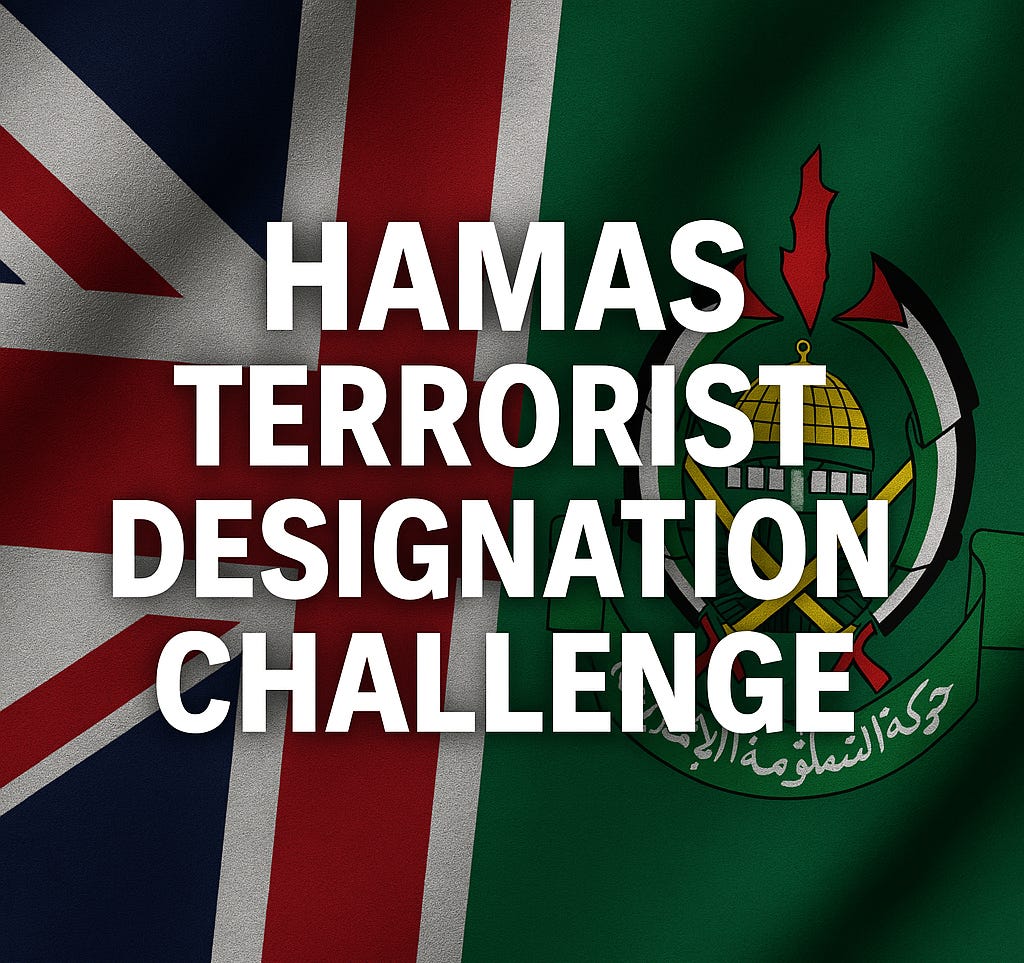Hamas Launches Effort to Reverse UK Terror Designation: Everything You Need to Know
As Hamas petitions to overturn its UK terror designation through British courts, a network of sanctioned actors, controversial lawyers, and ideological allies rallies behind it
In a new court filing submitted in Britain, Hamas launched a legal challenge against the United Kingdom’s 2021 decision to designate it as a terrorist organization. The group argues the ban violates the European Convention on Human Rights, claiming it restricts political expression and free speech.
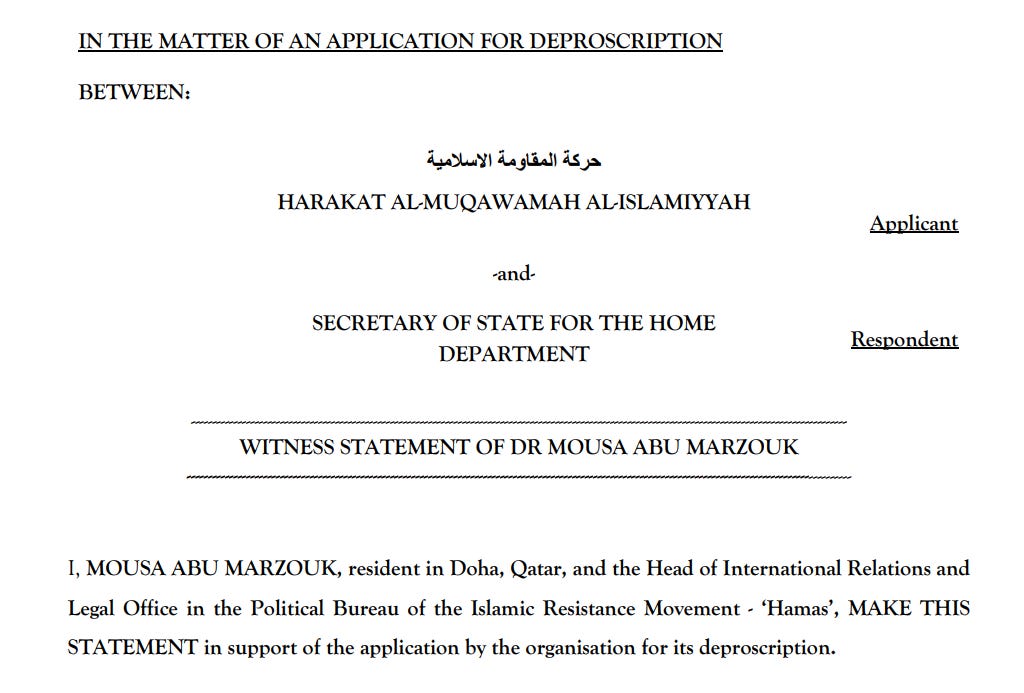
However, international observers and security officials have pointed to Hamas’s extensive record of terrorism, global financial networks, and ideological infiltration as overwhelming justification for the UK’s designation. Reversing that decision, they argue, would represent a dangerous step backward.
Robert Jenrick, a British member of parliament for Newark, responded to the petition, commenting that “Just over a year ago Hamas killed the largest number of Jewish people since the Holocaust. They still won’t return 59 hostages. Yet a UK law firm thinks there are arguments for their ban to be lifted. Sickening.”
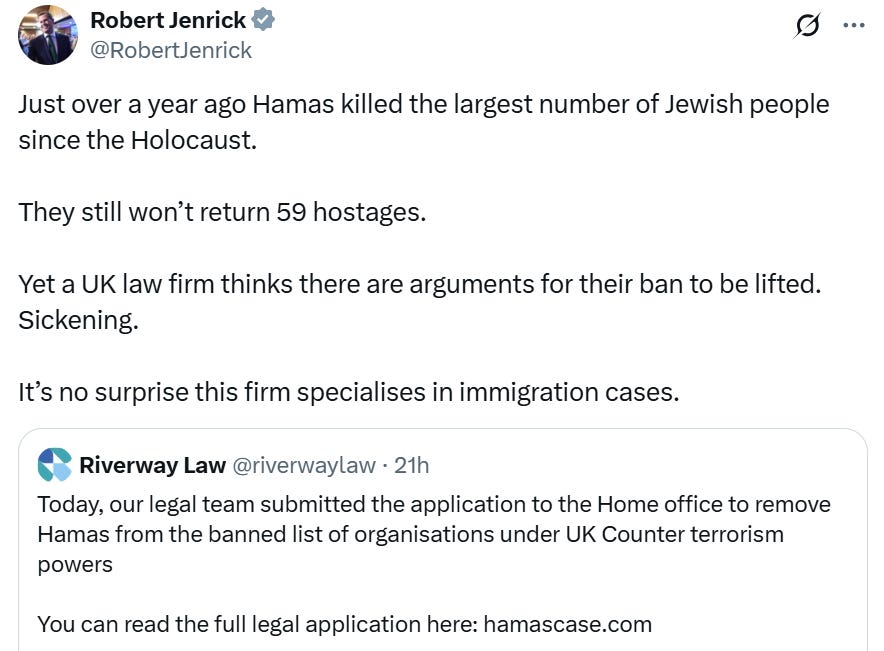
British-Palestinian peace activist John Aziz posted that “Hamas is a terrorist group and the UK should NEVER designate them as anything else.” Eugene Kontorovich, Executive Director of George Mason University’s Scalia Law School’s Center for the Middle East and International Law, stated that “The lawyers and ‘experts’ helping Hamas get undesignated as a terror group in the UK should be sanctioned by the U.S. for unambiguous material support to a State Dept. designated foreign terror organization.”
Hamas’ Transnational Threat
Hamas’s claim that it poses no threat outside of Israel is contradicted by its violent record. On October 7, 2023, the group launched an unprecedented terror assault on Israel, killing over 1,200 people—including dozens of foreign nationals—and abducting more than 250 hostages.
Hamas operates a sprawling global fundraising and logistics network. In March 2024, the U.S. Treasury sanctioned several individuals and entities, including Gaza Now founder Mustafa Ayash and UK national Aozma Sultana, for their role in funding Hamas through online campaigns. This followed three previous rounds of coordinated U.S.-UK sanctions packages targeting Hamas operatives following October 7th.
Already in October 2023, U.S. officials urged the UK to take firmer action. Deputy Treasury Secretary Wally Adeyemo emphasized the importance of international coordination in choking off Hamas’s access to funds.
The threat posed by Hamas extends beyond its military capabilities—it also lies in its ability to radicalize individuals toward violence. As author and activist Ayaan Hirsi Ali emphasized in an analysis for the Hoover Institution, Hamas represents not just a physical threat but an ideological one. Rooted in the framework of the Muslim Brotherhood, Hamas’ movement is designed to radicalize segments of foreign populations and erode democratic values from within.
This may help explain why, according to a UK poll conducted in April 2024, 46% of British Muslims expressed support for Hamas.
Hamas’ Legal Strategy and Its Backers
While Hamas’s legal petition proceeds through the courts, critics argue that its true aim may not be legal vindication but public relations. Critics like prominent scholar of antisemitism Izabella Tabarovsky contend the entire effort is less about legal merit than shaping Western perception. “It’s a PR exercise framed as a lawsuit,” she writes. “Even if they lose, this is an opportunity to air their ideas and anti-Israel lies yet again in front of Western audiences.”
A telling indication that this effort may be driven by public relations considerations, as well, is that a support website was launched in tandem with the petition, featuring multiple essays in defense of Hamas’s position. Troublingly, several contributors have direct ties to terrorist organizations.
Among them is Sami Al-Arian, a former U.S. academic convicted of financing Palestinian Islamic Jihad. Now based in Turkey, he regularly hosts events featuring Hamas leaders, as previously reported by Jewish Onliner.

Another contributor, Charlotte Kates, is a senior figure in Samidoun, a group banned as a terrorist entity by the U.S., Canada, Germany, and Israel.
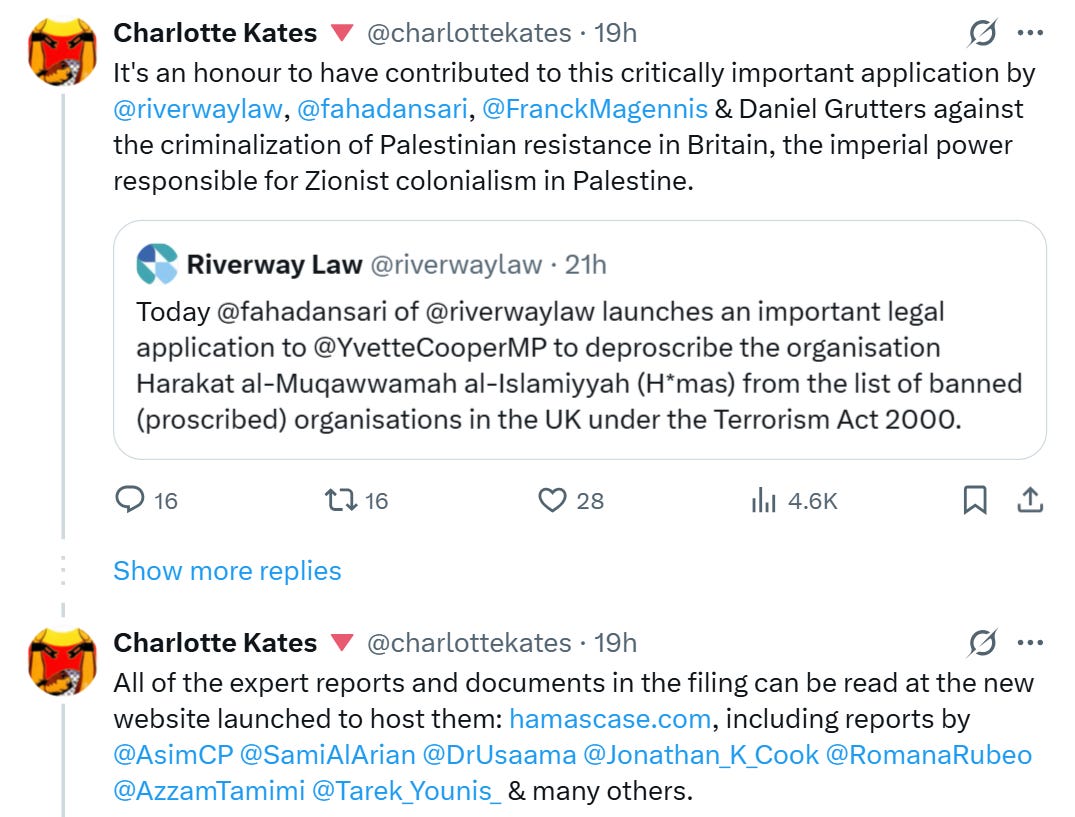
The legal representation itself has attracted controversy as well. Fahad Ansari of Riverway Law (the lead attorney on behalf of Hamas) and Franck Magennis both have public records of statements perceived as sympathetic to Hamas.
Ansari has posted a long thread on X in tribute of Hamas founder Ahmed Yassin and at least two posts in tribute to former leader Ismail Haniyeh following his assassination in 2024. Following the October 7th massacre, Ansari posted that he “support[s] their right to resist the racist, colonial setter state imposed upon them for over 75 years to return to the homes stolen from them in 1948.”
“The lawyers and ‘experts’ helping Hamas get undesignated as a terror group in the UK should be sanctioned by the U.S. for unambiguous material support to a State Dept. designated foreign terror organization.”
— Eugene Kontorovich, Executive Director of Scalia Law School’s Center for the Middle East and International Law
Magennis, meanwhile, posted “victory to the intifada” on October 7th, describes Zionism as “racism,” and has participated in pro-Hamas encampments on university campuses. The cover photo on his X account features an image of Ghassan Kanafani, a deceased senior official for the U.S. and E.U.-designated terror group, the Popular Front for the Liberation of Palestine.
Hamas' European Infrastructure
The petition to overturn the UK government’s Hamas designation is reflective of what is widely considered to be a growing Hamas advocacy network within the European continent, with Britain as one of its strongholds.
In fact, according to an in-depth report published by the European Leadership Network (ELNET), Hamas uses civilian front groups across Europe to further its agenda. These include charities, NGOs, and lobbying organizations, many of which operate behind humanitarian façades.
A central figure in the UK arm of this network is Zaher Birawi, described by ELNET as “one of the most prominent Hamas/Muslim Brotherhood-affiliated operatives in the UK.” In October 2023, UK Labour MP Christian Wakeford named Zaher Birawi as a key Hamas operative residing in London. Previously, the Israeli Ministry of Defense designated him as a main Hamas operative in Europe.
According to ELNET’s UK report, Britain has served as a strategic base for Hamas-linked operations since the 1990s. Groups like the Palestinian Return Centre, Interpal, Education Aid for Palestinians, and the Palestinian Forum in Britain are part of a network that uses charities, media outlets, and lobbying campaigns to subtly advance Hamas’s agenda.
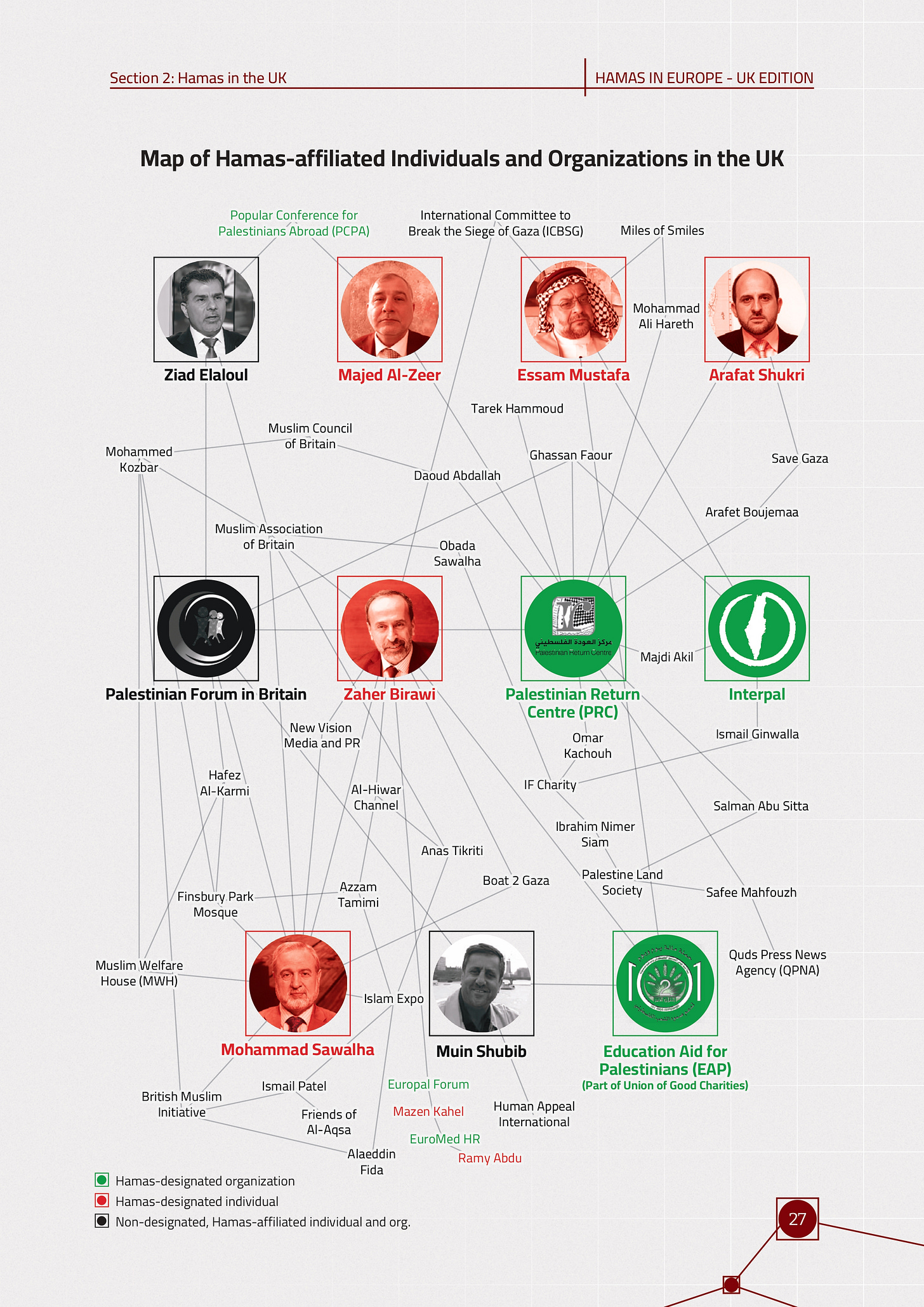
According to a December 2024 article in The Telegraph, Majed al-Zeer is listed on Companies House as the sole director of the Palestinian Return Centre. In October 2024, al-Zeer was sanctioned by the U.S. Treasury, which described him as “one of the senior Hamas members in Europe” who has “played a central role in the terrorist group’s European fundraising.”
The UK’s Response
One day after the petition was filed, British Home Secretary Yvette Cooper stated:
“Hamas is a terrorist organisation. It was a barbaric terrorist attack on October the seventh in Israel, and Hamas has long been a terrorist organisation and banned in the UK….We maintain our view about the barbaric nature of this organisation.”
This moment serves as a critical test of whether democratic institutions can uphold their values without becoming tools for groups like Hamas—an organization widely recognized as a terrorist group—to exploit in service of their broader agendas.



